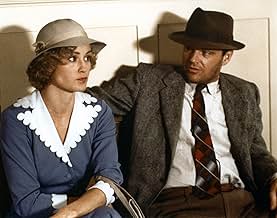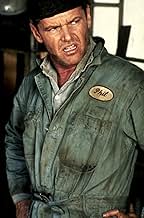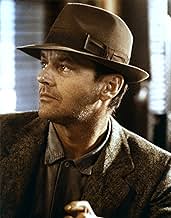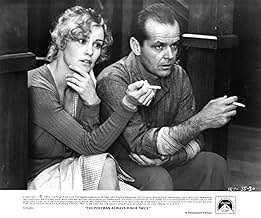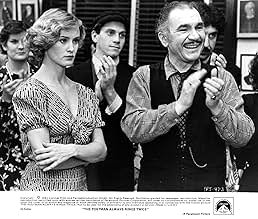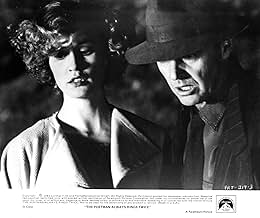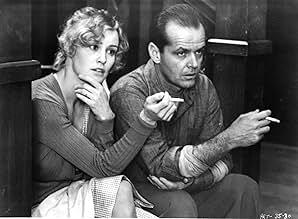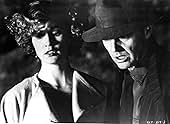AVALIAÇÃO DA IMDb
6,6/10
27 mil
SUA AVALIAÇÃO
A sensual esposa de um proprietário de lanchonete e um vagabundo sem raízes começam um caso sordidamente quente e conspiram para assassinar seu marido grego.A sensual esposa de um proprietário de lanchonete e um vagabundo sem raízes começam um caso sordidamente quente e conspiram para assassinar seu marido grego.A sensual esposa de um proprietário de lanchonete e um vagabundo sem raízes começam um caso sordidamente quente e conspiram para assassinar seu marido grego.
- Direção
- Roteiristas
- Artistas
- Prêmios
- 1 vitória e 2 indicações no total
Thomas Hill
- Barlow
- (as Tom Hill)
- Direção
- Roteiristas
- Elenco e equipe completos
- Produção, bilheteria e muito mais no IMDbPro
Avaliações em destaque
This remake of the 1946 film which starred Lana Turner and John Garfield is significantly better than its reputation. The script, adapted from James M. Cain's first novel, is by the award-winning playwright David Mamet, while the interesting and focused cinematography is by Sven Nykvist, who did so much exquisite work for Swedish director Ingmar Bergman. An excellent cast is led by Jack Nicholson and Jessica Lange, whose cute animal magnetism is well displayed. Bob Rafelson, who has to his directorial credit the acclaimed Five Easy Pieces (1970) and The King of Marvin Gardens (1972), both also starring Jack Nicholson, captures the raw animal sex that made Cain's novel so appealing (and shocking) to a depression-era readership and brings it up to date. Hollywood movies have gotten more violent and scatological since 1981, but they haven't gotten any sexier. This phenomenon is in part due to fears occasioned by the rise of AIDS encouraged by the usual blue stocking people. Don't see this movie if sex offends you.
Lange is indeed sexy and more closely fits the part of a lower-middle class woman who married an older man, a café owner, for security than the stunning blonde bombshell Lana Turner, who was frankly a little too gorgeous for the part. John Colicos plays the café owner, Nick Papadakis, with clear fidelity to Cain's conception. In the 1946 production, the part was played by Cecil Kellaway, who was decidedly English; indeed they changed the character's name to Smith. Also changed in that production was the name of the lawyer Katz (to Keats). One wonders why. My guess is that in those days they were afraid of offending Greeks, on the one hand, and Jews on the other. Here Katz is played by Michael Lerner who really brings the character to life.
Jack Nicholson's interpretation of Cain's antihero, an ex-con who beat up on the hated railway dicks while chasing any skirt that came his way, the kind of guy who acts out his basic desires in an amoral, animalistic way, was not entirely convincing, perhaps because Nicholson seems a little too sophisticated for the part. Yet, his performance may be the sort better judged by a later generation. I have seen him in so many films that I don't feel I can trust my judgment. My sense is that he's done better work, particularly in the two films mentioned above and also in Chinatown (1974), One Flew Over the Cuckoo's Nest (1975) and such later works as The Shining (1980) and Terms of Endearment (1983).
The problem with bringing Postman successfully to the screen is two-fold. One, the underlying psychology, which so strongly appealed to Cain's depression-era readership, is not merely animalistic. More than that it reflects the economic conflict between the established haves, as represented by the greedy lawyers, the well-heeled insurance companies, the implacable court system and the simple-minded cops, and to a lesser degree by property owner Nick Papadakis himself, and the out of work victims of the depression, the have-nots, represented by Frank and Cora (who had to marry for security). Two--and this is where both cinematic productions failed--the film must be extremely fast-paced, almost exaggeratedly so, to properly capture the spirit and sense of the Cain novel. Frank and Cora are rushing headlong into tragedy and oblivion, and the pace of the film must reflect that. A true to the spirit adaptation would require a terse, stream-lined directorial style with an emphasis on blind passions unconsciously acted out, something novelist Cormac McCarthy might accomplish if he directed film. I think that Christopher Nolan, who directed the strikingly original Memento (2000) could do it.
For further background on the novel and some speculation on why it was called "The Postman Always Rings Twice" (Cain's original, apt title was "Bar-B-Que") see my review at Amazon.com.
(Note: Over 500 of my movie reviews are now available in my book "Cut to the Chaise Lounge or I Can't Believe I Swallowed the Remote!" Get it at Amazon!)
Lange is indeed sexy and more closely fits the part of a lower-middle class woman who married an older man, a café owner, for security than the stunning blonde bombshell Lana Turner, who was frankly a little too gorgeous for the part. John Colicos plays the café owner, Nick Papadakis, with clear fidelity to Cain's conception. In the 1946 production, the part was played by Cecil Kellaway, who was decidedly English; indeed they changed the character's name to Smith. Also changed in that production was the name of the lawyer Katz (to Keats). One wonders why. My guess is that in those days they were afraid of offending Greeks, on the one hand, and Jews on the other. Here Katz is played by Michael Lerner who really brings the character to life.
Jack Nicholson's interpretation of Cain's antihero, an ex-con who beat up on the hated railway dicks while chasing any skirt that came his way, the kind of guy who acts out his basic desires in an amoral, animalistic way, was not entirely convincing, perhaps because Nicholson seems a little too sophisticated for the part. Yet, his performance may be the sort better judged by a later generation. I have seen him in so many films that I don't feel I can trust my judgment. My sense is that he's done better work, particularly in the two films mentioned above and also in Chinatown (1974), One Flew Over the Cuckoo's Nest (1975) and such later works as The Shining (1980) and Terms of Endearment (1983).
The problem with bringing Postman successfully to the screen is two-fold. One, the underlying psychology, which so strongly appealed to Cain's depression-era readership, is not merely animalistic. More than that it reflects the economic conflict between the established haves, as represented by the greedy lawyers, the well-heeled insurance companies, the implacable court system and the simple-minded cops, and to a lesser degree by property owner Nick Papadakis himself, and the out of work victims of the depression, the have-nots, represented by Frank and Cora (who had to marry for security). Two--and this is where both cinematic productions failed--the film must be extremely fast-paced, almost exaggeratedly so, to properly capture the spirit and sense of the Cain novel. Frank and Cora are rushing headlong into tragedy and oblivion, and the pace of the film must reflect that. A true to the spirit adaptation would require a terse, stream-lined directorial style with an emphasis on blind passions unconsciously acted out, something novelist Cormac McCarthy might accomplish if he directed film. I think that Christopher Nolan, who directed the strikingly original Memento (2000) could do it.
For further background on the novel and some speculation on why it was called "The Postman Always Rings Twice" (Cain's original, apt title was "Bar-B-Que") see my review at Amazon.com.
(Note: Over 500 of my movie reviews are now available in my book "Cut to the Chaise Lounge or I Can't Believe I Swallowed the Remote!" Get it at Amazon!)
This novel adaptation was the second after a first movie in the 1940s. This one retains the period setting but ups the ante in terms of sexual content, featuring one of the most explicit sex scenes ever shown in a mainstream film which goes far further than any film before - or since.
The plot is simple in the extreme: the wife of a Greek man who runs his own diner, bored and neglected by her husband, begins a torrid affair with a drifter her husband employs as his mechanic. From there on in, the story gradually develops in often fascinating ways as the two lovers realise that only one thing's stopping their happiness: her husband.
The film is shot through with a grim and gritty emphasis, best realised by Nicholson's grubby mechanic. He's nobody's idea of a sex symbol, although Jessica Lange is quite ravishing as the object of his attentions. This focus on realism over Hollywood fantasy is what makes the film so watchable and, in places, uncomfortable as it becomes clear that the lovers have something of a sado-masochistic relationship.
Things move into courtroom-drama territory later on (featuring some terrific acting work from Michael Lerner as the lawyer) whilst handing a number of blink-and-you'll-miss-em minor parts to familiar faces (John P. Ryan as a blackmailer, Angelica Houston as - bizarrely - a circus owner, cult favourite Don Calfa as a circus hand, Brion James as a thug and Christopher Lloyd as a salsman).
I found the film to be sometimes compelling and never boring. It's one of those films you watch to find out just what happens to the central characters, a curiosity bolstered by the feeling that they're never going to unentangle themselves from this mess. Come the surprise climax, well...you'll have to see for yourself.
The plot is simple in the extreme: the wife of a Greek man who runs his own diner, bored and neglected by her husband, begins a torrid affair with a drifter her husband employs as his mechanic. From there on in, the story gradually develops in often fascinating ways as the two lovers realise that only one thing's stopping their happiness: her husband.
The film is shot through with a grim and gritty emphasis, best realised by Nicholson's grubby mechanic. He's nobody's idea of a sex symbol, although Jessica Lange is quite ravishing as the object of his attentions. This focus on realism over Hollywood fantasy is what makes the film so watchable and, in places, uncomfortable as it becomes clear that the lovers have something of a sado-masochistic relationship.
Things move into courtroom-drama territory later on (featuring some terrific acting work from Michael Lerner as the lawyer) whilst handing a number of blink-and-you'll-miss-em minor parts to familiar faces (John P. Ryan as a blackmailer, Angelica Houston as - bizarrely - a circus owner, cult favourite Don Calfa as a circus hand, Brion James as a thug and Christopher Lloyd as a salsman).
I found the film to be sometimes compelling and never boring. It's one of those films you watch to find out just what happens to the central characters, a curiosity bolstered by the feeling that they're never going to unentangle themselves from this mess. Come the surprise climax, well...you'll have to see for yourself.
A remake of the 1946 film, this version features Jack Nicholson and Jessica Lange, with a momentous white hot chemistry that can't possibly sustain itself but affords a memorable scene in the restaurant kitchen about ten minutes into the film which leads to the eventual plot to do in her older Greek husband. A story wherein neither would have the nerve to do such a thing alone, but together they make a job of it on one of the darkest nights and darkest rural roads ever. The trial for the murder features another couple of great performances by Michael Lerner as the resourceful to a fault defense attorney (if you were on trial for your life, you'd want this guy for a lawyer), and his investigator who becomes a menacing presence later in the film, played by John P Ryan. Very nicely photographed in color, it's set in the coastal hills and valleys north of LA, dotted with live oaks and capturing the rich earthy tones of the late afternoon golden hued hillsides that nicely contrast with the desperate story of the two lovers.
The Postman Always Rings Twice (1981)
** (out of 4)
Considering the talent in front of and behind the camera, there's really no way to look at this adaptation of the James M. Cain novel as anything but a disappointment. In the film, Jack Nicholson plays drifter Frank Chambers who enters the lives of Cora (Jessica Lange) and her much older husband Nick (John Colicos). Soon the drifter and Cora start up a sexual relationship, which leads to them planning the murder of the husband. This here would be the fourth version of the classic story and the second one filmed in America. Unlike the previous versions, director Bob Rafelson didn't have to worry about censors but even so this version isn't nearly as hot as the earlier one with Lana Turner. Outside a rather intense sex scene towards the start of the picture, this thing really never takes off, which is too bad because they've got a terrific cast and some beautiful settings but in the end the film is just flat. I think the first forty- five minutes are the best thing in the film as we see the love triangle set up and there's no question that the director has the look of the era down perfectly. I thought the setting really added a lot of atmosphere but sadly very little else happens. Nicholson was the perfect choice to play a drifter but the screenplay really doesn't give him too much to work with. Lange is clearly the best thing in the movie as she delivers a sexual charge to the thing. Colicos is also extremely good as the husband in a strong supporting performance. What really hurts the film is the second half because the director never really makes us believe or feel anything for the two leads. Are we supposed to hate them for what they've done? Are we supposed to be rooting for them to get away with the murder and live happily ever after? The entire second half of the film features way too many dialogue scenes that lead no where and in the end the "romance" that starts to bloom towards the end just never fully works. The film isn't nearly as bad as its reputation but at the same time there's no question that it's a major disappointment and a bitter feeling takes over when you think about what could have been.
** (out of 4)
Considering the talent in front of and behind the camera, there's really no way to look at this adaptation of the James M. Cain novel as anything but a disappointment. In the film, Jack Nicholson plays drifter Frank Chambers who enters the lives of Cora (Jessica Lange) and her much older husband Nick (John Colicos). Soon the drifter and Cora start up a sexual relationship, which leads to them planning the murder of the husband. This here would be the fourth version of the classic story and the second one filmed in America. Unlike the previous versions, director Bob Rafelson didn't have to worry about censors but even so this version isn't nearly as hot as the earlier one with Lana Turner. Outside a rather intense sex scene towards the start of the picture, this thing really never takes off, which is too bad because they've got a terrific cast and some beautiful settings but in the end the film is just flat. I think the first forty- five minutes are the best thing in the film as we see the love triangle set up and there's no question that the director has the look of the era down perfectly. I thought the setting really added a lot of atmosphere but sadly very little else happens. Nicholson was the perfect choice to play a drifter but the screenplay really doesn't give him too much to work with. Lange is clearly the best thing in the movie as she delivers a sexual charge to the thing. Colicos is also extremely good as the husband in a strong supporting performance. What really hurts the film is the second half because the director never really makes us believe or feel anything for the two leads. Are we supposed to hate them for what they've done? Are we supposed to be rooting for them to get away with the murder and live happily ever after? The entire second half of the film features way too many dialogue scenes that lead no where and in the end the "romance" that starts to bloom towards the end just never fully works. The film isn't nearly as bad as its reputation but at the same time there's no question that it's a major disappointment and a bitter feeling takes over when you think about what could have been.
The story of a drifter working on a by the road dinner, and the owner's wife, disenchanted with her marriage sets upon herself to seduce the drifter in the hopes of a more satisfying relationship.
This is the base of the script, in which Jessica Lange and Jack Nicholson shine in their performances bringing different dimensions to their characters and, in true, bringing them to life.
Frank Chambers (Jack Nicholson) is a bored drifter, with some jail time under his belt not looking for anything in particular. He gets enchanted by Cora (Jessica Lange) and ends up doing everything for them to be together.
I think Jack Nicholson is an outstanding performer and it shows here some glimpses of what he will put in The Shining later on.
I also particularly liked John P. Ryan in the small supporting role of Kennedy where we can see in him the double-stabbing typical that he will show in later roles.
All in all it is a good movie, but I don't consider it as being erotic. Maybe for 1980's standards, but even so I doubt it.
This is the base of the script, in which Jessica Lange and Jack Nicholson shine in their performances bringing different dimensions to their characters and, in true, bringing them to life.
Frank Chambers (Jack Nicholson) is a bored drifter, with some jail time under his belt not looking for anything in particular. He gets enchanted by Cora (Jessica Lange) and ends up doing everything for them to be together.
I think Jack Nicholson is an outstanding performer and it shows here some glimpses of what he will put in The Shining later on.
I also particularly liked John P. Ryan in the small supporting role of Kennedy where we can see in him the double-stabbing typical that he will show in later roles.
All in all it is a good movie, but I don't consider it as being erotic. Maybe for 1980's standards, but even so I doubt it.
Você sabia?
- CuriosidadesDavid Mamet's first screenplay.
- Erros de gravaçãoModern-day paper currency is used in craps game set during Great Depression, instead of silver certificate dollar bills then in use.
- Citações
Cora: I gotta have you, Frank. If it was just us. If it was just you and me.
Frank Chambers: What are you talking about?
Cora: I'm getting tired of what's right and wrong.
Frank Chambers: They hang people for that, Cora.
- Versões alternativasCBS edited 30 minutes from this film for its 1986 network television premiere.
- ConexõesEdited into American Cinema: Film Noir (1995)
Principais escolhas
Faça login para avaliar e ver a lista de recomendações personalizadas
- How long is The Postman Always Rings Twice?Fornecido pela Alexa
Detalhes
- Data de lançamento
- Países de origem
- Idiomas
- Também conhecido como
- El cartero siempre llama dos veces
- Locações de filme
- Barnsdall Rio Grande Service Station, Goleta, Califórnia, EUA(Cora and a Drunk Nick and Frank get Fuel)
- Empresas de produção
- Consulte mais créditos da empresa na IMDbPro
Bilheteria
- Orçamento
- US$ 12.000.000 (estimativa)
- Faturamento bruto nos EUA e Canadá
- US$ 12.376.625
- Faturamento bruto mundial
- US$ 12.383.416
Contribua para esta página
Sugerir uma alteração ou adicionar conteúdo ausente

Principal brecha
What was the official certification given to O Destino Bate à sua Porta (1981) in Japan?
Responda

